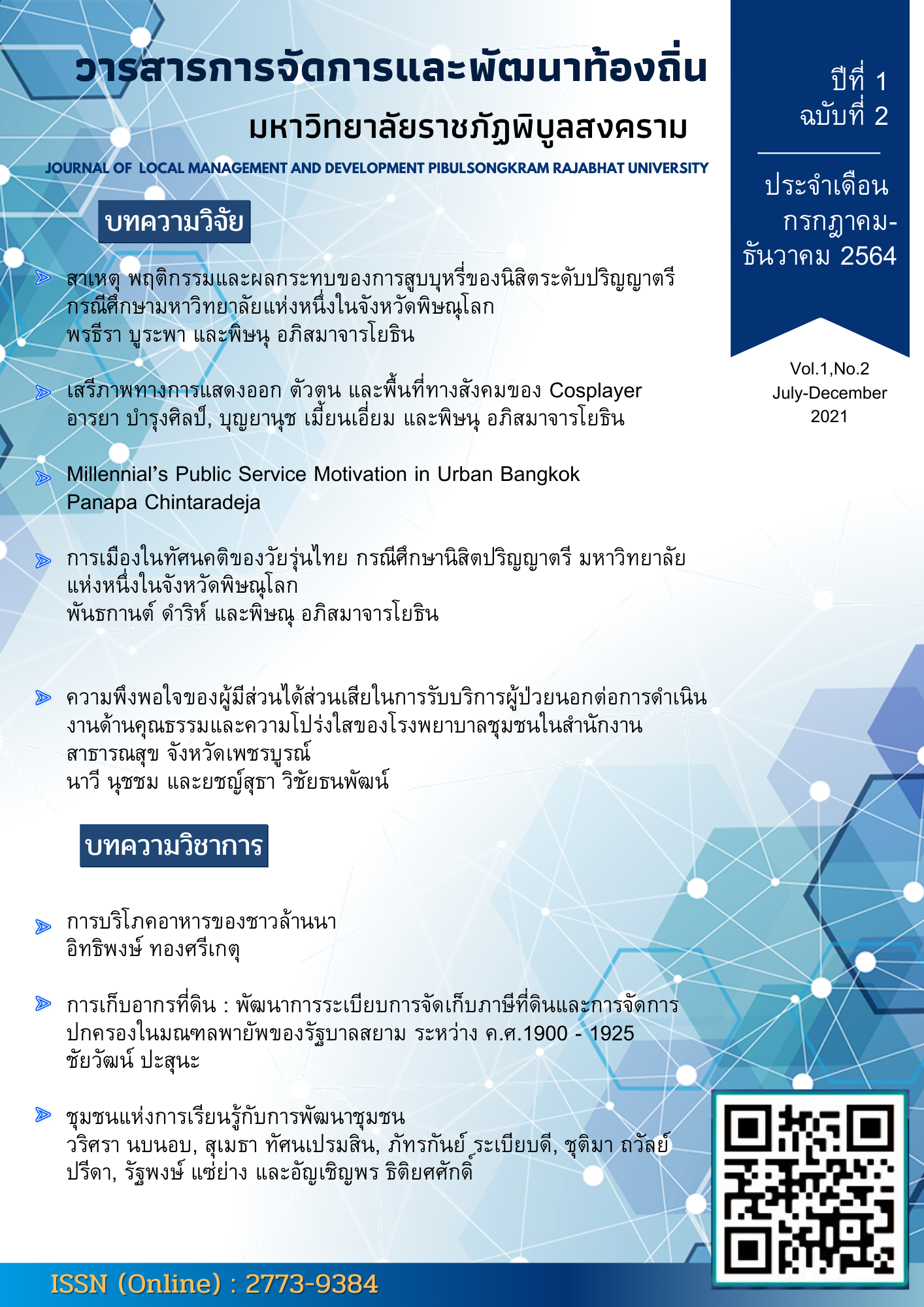Expression Freedom, Self and Social Space of Cosplayer
Keywords:
Cosplayer, Self, Expression Freedom, Social SpaceAbstract
This research aims to 1) study self-construction of cosplayer, 2) study the social space of cosplayer, 3) study expression freedom of cosplayer, 4) study challenges, barriers, and responses of the cosplayer. The key informants were 9 cosplayers. The research instrument was a semi-structured interview. The results showed that cosplayers in Muang District, Phitsanulok Province. Had two types of self-construction included individual Self that was as same as most people in society, and the cosplay self. That had been construation through the costumes. Therefore, the expression freedom of a cosplayer in Muang District, Phitsanulok Province has limited. As a result, the cosplayers has to find new areas to express themselves which includeed both real space and online space. Besides, cosplayer's freedom of expression was greater than in the past, but, it still viewed by outsiders as strange and had depression within the cosplay society. The cosplayers costume still facing with various barriers and challenges. Most of challenges come from family members and often from friends or close people. Therefore, the cosplayer group had to deal with these barriers and challenges.
References
วิทยานิพนธ์ปริญญานิเทศศาสตรมหาบัณฑิต จุฬาลงกรณ์มหาวิทยาลัย.
ฎูริณัฐร์ โชติวรรณ. (2557). กะเทยโรงงาน : ชีวิตและตัวตนข้ามเพศของแรงงานอพยพจากภาค ตะวันออกเฉียงเหนือ (วิทยานิพนธ์ปริญญาศิลปศาสตรมหาบัณฑิต). เชียงใหม่: มหาวิทยาลัยเชียงใหม่. สืบค้นเมื่อวันที่ 5 ธันวาคม 2563 https://dric.nrct.go.th/SearchDetail/307538
เบญจมาศ ยศพิทักษ์. (2553). การสื่อสารกลุ่มแรงจูงใจในการแต่งกายคอสเพลย์ของวัยรุ่นไทย
วิทยานิพนธ์ปริญญาศิลปะศาสตรมหาบัณฑิต มหาวิทยาลัยมหิดล.
รัชนก พุทธสุขา. (2562). ทำความรู้จักกลุ่ม Cosplay ในสังคมไทย ผู้เลือกรับ Japanese pop culture.
สืบค้นเมื่อวันที่ 5 ธันวาคม 2563, จาก https://www.museumsiam.org/da- detail2.php?MID=3&CID=177&SCID=242&CONID=3188
รุ้งนภา ยรรยงเกษมสุข. (ม.ป.ป.). ทฤษฎีปฏิสัมพันธ์เชิงสัญลักษณ์กับการอธิบายปรากฏการณ์สังคมจากมุมมอง
ตัวแสดง Symbolic Interaction Theory and the Explanation of Social Phenomena from
Actor Perspective. วารสารการเมือง การบนิหาร และกฎหมาย, 5(2), 77-80.
รัตติกานต์ วิไลพันธ์ และพิษนุ อภิสมาจารโยธิน. (2562). การประกอบสร้างตัวตนทางเพศ และพื้นที่ทางสังคม ของกลุ่มแฟนคลับศิลปินเกาหลีใต้ : กรณีศึกษากลุ่มวัยรุ่นไทยในกรุงเทพมหานคร. ใน นเรศวรวิจัย
ครั้งที่ 13 (น.6). พิษณุโลก : มหาวิทยาลัยนเรศวร.

Downloads
Published
Issue
Section
License
ประกาศเกี่ยวกับลิขสิทธิ์
- เนื้อหาและข้อมูลในบทความที่ลงพิมพ์กับวิทยาลัยการจัดการและพัฒนาท้องถิ่นถือเป็นข้อคิดเห็น และความรับผิดชอบของผู้เขียนบทความโดยตรงซึ่งกองบรรณาธิการวารสารไม่จำเป็นต้องเห็นด้วย หรือร่วมรับผิดชอบใด ๆ
- บทความ ข้อมูล เนื้อหา รูปภาพ ฯลฯ ที่ได้รับการตีพิมพ์ในวิทยาลัยการจัดการและพัฒนาท้องถิ่นถือเป็นลิขสิทธิ์ของวารสารวารสารวิทยาลัยการจัดการและพัฒนาท้องถิ่น หากบุคคลหรือหน่วยงานใดต้องการนำทั้งหมดหรือส่วนหนึ่ง ส่วนใดไปเผยแพร่ต่อหรือเพื่อการกระทำการใด ๆ จะต้องได้รับอนุญาตเป็นลายลักษณ์อักษรจากวิทยาลัยการจัดการและพัฒนาท้องถิ่นก่อนเท่านั้น





